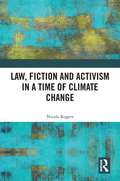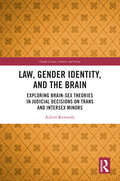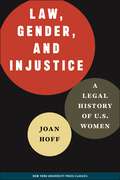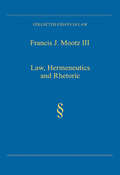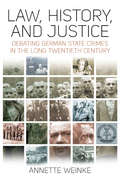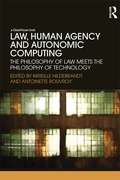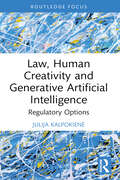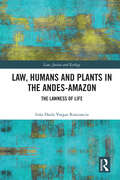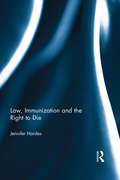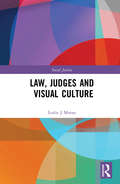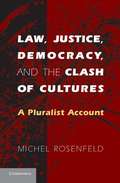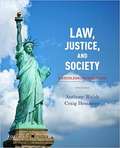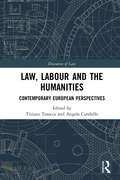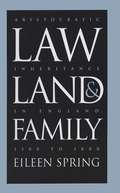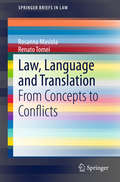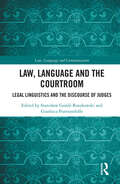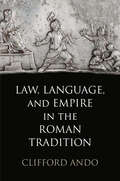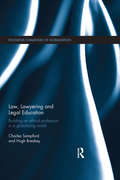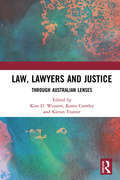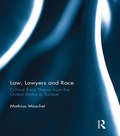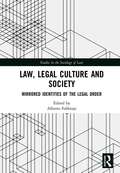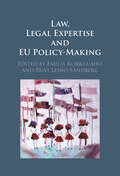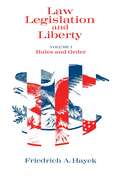- Table View
- List View
Law, Fiction and Activism in a Time of Climate Change
by Nicole RogersThe book examines the narratives of climate change which have developed and which are currently evolving in three areas: law, fiction and activism. Narratives of climate change generated by litigants, judges, writers of fiction and activists are having, and will have, a profound effect on the way we respond to the climate change crisis. Acknowledging the prevalence of unreliable narrators, this book explores the reliability and significance of different forms of climate narrative. The author analyses overlapping themes and points of intersection, considering the recurrent motif of the trickster, the prominence of the child, the significance and ongoing viability of the rights discourse, and the increasingly prevalent emergency framing with its multiple implications for law’s empire. She asks how law, fiction and activism measure up as textual and performative fora for telling the story of climate change and anticipating a climate-changed future. And, in addition, how can they help foster transformative narratives which empower us to confront the climate change crisis? This highly topical, cross-disciplinary work will be of interest to anyone concerned about the growing climate emergency and makes a valuable contribution to climate law, environmental law, the environmental humanities and ecocriticism.
Law, Gender Identity, and the Brain: Exploring Brain-Sex Theories in Judicial Decisions on Trans and Intersex Minors (Gender in Law, Culture, and Society)
by Aileen KennedyThis book challenges law’s reliance on neurology’s brain-sex binary. The brain has become the latest candidate in a historical search for a reliable and fixed biological marker of ‘true sex’ that has permeated every aspect of Western culture, including law. As definitions of the sexed and gendered body have become ever more contentious, the development and dissemination of brain-sex theories have come to dominate popular understanding of LGBTI+ identities. But, this book argues, the brain is no more helpful than earlier biological measures in ensuring just outcomes. Examining how law determines and differentiates ‘male’ and ‘female’ in two contested areas of sexed identity –through a discussion of Australian cases authorising medical interventions to alter the embodied sex characteristics of transgender minors and intersex minors –the book demonstrates an incoherence in the legal understanding of gender identity development. As the brain too fails as a convincing biological anchor for the binary sex categories of male and female, law must, it is argued, retreat from its aspiration to create, define, and regulate artificially bounded sex categories of male and female. This book will be of great interest to scholars and students in a range of disciplines who are working at the intersection of law, gender, and sexuality.
Law, Gender, and Injustice: A Legal History of U.S. Women (Feminist Crosscurrents)
by Joan HoffA groundbreaking analysis of how gendered oppression is written into the American legal systemLaw, Gender, and Injustice: A Legal History of U.S. Woman is a landmark study of how women remain second-class citizens under the current legal system. In this widely acclaimed book, Joan Hoff questions whether the continued pursuit of equality based on a one-size-fits-all vision of traditional individual rights is really what will most improve conditions for women in America. Concluding that equality based on liberal male ideology is no longer an adequate framework for improving women's legal status, Hoff's highly original and incisive volume calls for a demystification of legal doctrine and a reinterpretation of legal texts (including the Constitution) to create a feminist jurisprudence.
Law, Hermeneutics and Rhetoric (Collected Essays In Law Ser.)
by Francis J. IiiMootz offers an antidote to the fragmentation of contemporary legal theory with a collection of essays arguing that legal practice is a hermeneutical and rhetorical event that can best be understood and theorized in those terms. This is not a modern insight that wipes away centuries of dogmatic confusion; rather, Mootz draws on insights as old as the Western tradition itself. However, the essays are not antiquarian or merely descriptive, because hermeneutical and rhetorical philosophy have undergone important changes over the millennia. To "return" to hermeneutics and rhetoric as touchstones for law is to embrace dynamic traditions that provide the resources for theorists who seek to foster persuasion and understanding as an antidote to the emerging global order and the trend toward bureaucratization in accordance with expert administration, violent suppression, or both.
Law, History, and Justice: Debating German State Crimes in the Long Twentieth Century
by Annette WeinkeSince the nineteenth century, the development of international humanitarian law has been marked by complex entanglements of legal theory, historical trauma, criminal prosecution, historiography, and politics. All of these factors have played a role in changing views on the applicability of international law and human-rights ideas to state-organized violence, which in turn have been largely driven by transnational responses to German state crimes. Here, Annette Weinke gives a groundbreaking long-term history of the political, legal and academic debates concerning German state and mass violence in the First World War, during the National Socialist era and the Holocaust, and under the GDR.
Law, History, and Justice: Debating German State Crimes in the Long Twentieth Century
by Annette WeinkeSince the nineteenth century, the development of international humanitarian law has been marked by complex entanglements of legal theory, historical trauma, criminal prosecution, historiography, and politics. All of these factors have played a role in changing views on the applicability of international law and human-rights ideas to state-organized violence, which in turn have been largely driven by transnational responses to German state crimes. Here, Annette Weinke gives a groundbreaking long-term history of the political, legal and academic debates concerning German state and mass violence in the First World War, during the National Socialist era and the Holocaust, and under the GDR.
Law, Human Agency and Autonomic Computing: The Philosophy of Law Meets the Philosophy of Technology
by Mireille Hildebrandt Antoinette RouvroyLaw, Human Agency and Autonomic Computing interrogates the legal implications of the notion and experience of human agency implied by the emerging paradigm of autonomic computing, and the socio-technical infrastructures it supports. The development of autonomic computing and ambient intelligence – self-governing systems – challenge traditional philosophical conceptions of human self-constitution and agency, with significant consequences for the theory and practice of constitutional self-government. Ideas of identity, subjectivity, agency, personhood, intentionality, and embodiment are all central to the functioning of modern legal systems. But once artificial entities become more autonomic, and less dependent on deliberate human intervention, criteria like agency, intentionality and self-determination, become too fragile to serve as defining criteria for human subjectivity, personality or identity, and for characterizing the processes through which individual citizens become moral and legal subjects. Are autonomic – yet artificial – systems shrinking the distance between (acting) subjects and (acted upon) objects? How ‘distinctively human’ will agency be in a world of autonomic computing? Or, alternatively, does autonomic computing merely disclose that we were never, in this sense, ‘human’ anyway? A dialogue between philosophers of technology and philosophers of law, this book addresses these questions, as it takes up the unprecedented opportunity that autonomic computing and ambient intelligence offer for a reassessment of the most basic concepts of law.
Law, Human Creativity and Generative Artificial Intelligence: Regulatory Options
by Julija KalpokienėThis book addresses the complex issue of human creativity in the age of Artificial Intelligence.Artificial intelligence (AI) is increasingly being used to create texts, images, and musical compositions. This increase in the application of AI within the creative industries can of course enhance human performance while producing creative and commercial challenges for human authors. Against this background, this book considers how current mechanisms for incentivising creativity – including legal regulations, such as copyright, state funding and tax regimes – are inadequate in the age of AI. Acknowledging the opportunity that AI presents, the book then proposes alternative regulatory mechanisms through which human creativity can be incentivised.This book will appeal to scholars and researchers in the areas of socio-legal studies, intellectual property law, media law, and law and technology.
Law, Humans and Plants in the Andes-Amazon: The Lawness of Life (Law, Justice and Ecology)
by Iván Darío Vargas RoncancioExtending law beyond the human, the book examines the conceptual openings, methodological challenges, and ethical conundrums of law in a time of socio-ecological transition. How do we learn and practice law across epistemic and ontological difference? What sort of methodologies do we need? In what sense does conjuring other-than-human beings as sentient, cognitive and social agents—rather than mere recipients of state-sanctioned rights—transform what we mean by law and rights of nature in Latin America and beyond? Legal institutions exclusively focused on human perspectives seem insufficiently capable of addressing current socio-ecological challenges in Latin America and beyond. In response, this book strives to integrate other-than-human beings within legal thinking, institutions, and decision-making protocols. Weaving together various fields of knowledge and worldmaking practices that include – but are not limited to – Indigenous legal traditions, ecological law, multispecies ethnography, and ecological economics, the book pursues a multi-sited ethnography that focuses on the entanglement of law, ecology, and Indigenous cosmologies in Southern Colombia. In so doing, it articulates a general post-anthropocentric legal theory which is proposed, a tool to address socio-ecological challenges such as climate change and bio-cultural loss. This book will be of interest to scholars and students in the disciplines of environmental law, Earth law and ecological law, legal theory and critical legal studies; as well as others working in the in the fields of Indigenous studies, environmental humanities, legal anthropology, and sustainability and climate change justice.
Law, Immunization and the Right to Die
by Jennifer HardesLaw, Immunization and the Right to Die focuses on the urgent matter of legal appeals and judicial decisions on assisted death. Drawing on key cases from the United Kingdom and Canada, the book focuses on the problematic paternalism of legal decisions that currently deny assisted dying and questions why the law fails to recognize what many describe as "compassionate motives" for assisted death. When cases are analyzed as discourses that are part of a larger socio-political logic of governance, judicial decisions, it is argued here, reveal themselves as relying on the construction of neoliberal fictions – fictions that are here elucidated with reference to Michel Foucault’s theoretical insights on pastoral power and Roberto Esposito’s philosophical thesis on immunization. Challenging the socio-political logic of neoliberalism, the issue of assisted dying goes beyond the predominant legal concern with protecting – or immunizing – individuals from one another, in favor of minimal interference. This book calls for a new kind of politics: one that might affirm people and their finitude both more collectively, and more compassionately.
Law, Judges and Visual Culture (Social Justice)
by Leslie J MoranLaw, Judges and Visual Culture analyses how pictures have been used to make, manage and circulate ideas about the judiciary through a variety of media from the sixteenth century to the present. This book offers a new approach to thinking about and making sense of the important social institution that is the judiciary. In an age in which visual images and celebrity play key roles in the way we produce, communicate and consume ideas about society and its key institutions, this book provides the first in-depth study of visual images of judges in these contexts. It not only examines what appears within the frame of these images; it also explores the impact technologies and the media industries that produce them have upon the way we engage with them, and the experiences and meanings they generate. Drawing upon a wide range of scholarship – including art history, film and television studies, and social and cultural studies, as well as law – and interviews with a variety of practitioners, painters, photographers, television script writers and producers, as well as court communication staff and judges, the book generates new and unique insights into making, managing and viewing pictures of judges. Original and insightful, Law, Judges and Visual Culture will appeal to scholars, postgraduates and undergraduates from a variety of disciplines that hold an interest in the role of visual culture in the production of social justice and its institutions.
Law, Justice, Democracy, and the Clash of Cultures
by Michel RosenfeldThe Cold War ideological battle with universal aspirations has given way to a clash of cultures as the world concurrently moves toward globalization of economies and communications and balkanization through a clash of ethnic and cultural identities. Traditional liberal theory has confronted daunting challenges in coping with these changes and with recent developments such as the spread of postmodern thought, religious fundamentalism, and global terrorism. This book argues that a political and legal philosophy based on pluralism is best suited to confront the problems of the twenty-first century. Pointing out that monist theories such as liberalism have become inadequate and that relativism is dangerous, the book makes the case for pluralism from the standpoint of both theory and its applications. The book engages with thinkers, such as Spinoza, Kant, Hegel, Rawls, Berlin, Dworkin, Habermas, and Derrida, and with several subjects that are at the center of current controversies, including equality, group rights, tolerance, secularism confronting religious revival, and political rights in the face of terrorism.
Law, Justice, and Society: A Sociolegal Introduction
by Craig Hemmens Anthony WalshAn accessible and lively introduction to the field, Law, Justice, and Society: A Sociolegal Introduction, Fifth Edition, explores the relationship between legal systems and other social institutions using a distinctive sociological point of view. Anthony Walsh and Craig Hemmens provide detailed discussions of the various ways in which law impacts people based on race, class, gender, and age while also introducing students to the origins of the law, the history and development of the American legal system, the sociology of law, court structure, and the difference between civil and criminal law.
Law, Labour and the Humanities: Contemporary European Perspectives
by Angela Condello Tiziano ToraccaThe ontology of work and the economics of value underpin the legal institution, with the existence of modern law predicated upon the subject as labourer. In contemporary Europe, labour is more than a mere economic relationship. Indeed, labour occupies a central position in human existence: since the industrial revolution, it has been the principal criterion of reciprocal recognition and of universal mobilization. This multi-disciplinary volume analyses labour and its depictions in their interaction with the latest legal, socio-economic, political and artistic tendencies. Addressing such issues as deregulation, flexibility, de-industrialization, the pervasive enlargement of markets, digitization and virtual relationships, social polarisation and migratory fluxes, this volume engages with the existential role played by labour in our lives at the conjunction of law and the humanities. This book will be of interest to law students, legal philosophers, theoretical philosophers, political philosophers, social and political theorists, labour studies scholars, and literature and film scholars.
Law, Land, and Family
by Eileen SpringEileen Spring presents a fresh interpretation of the history of inheritance among the English gentry and aristocracy. In a work that recasts both the history of real property law and the history of the family, she finds that one of the principal and determinative features of upper-class real property inheritance was the exclusion of females. This exclusion was accomplished by a series of legal devices designed to nullify the common-law rules of inheritance under which--had they prevailed--40 percent of English land would have been inherited or held by women. Current ideas of family development portray female inheritance as increasing in the seventeenth and eighteenth centuries, but Spring argues that this is a misperception, resulting from an incomplete consideration of the common-law rules. Female rights actually declined, reaching their nadir in the eighteenth century. Spring shows that there was a centuries-long conflict between male and female heirs, a conflict that has not been adequately recognized until now.
Law, Language and Translation
by Rosanna Masiola Renato TomeiThis book is a survey of how law, language and translation overlap with concepts, crimes and conflicts. It is a transdisciplinary survey exploring the dynamics of colonialism and the globalization of crime. Concepts and conflicts are used here to mean 'conflicting interpretations' engendering real conflicts. Beginning with theoretical issues and hermeneutics in chapter 2, the study moves on to definitions and applications in chapter 3, introducing cattle stealing as a comparative theme and global case study in chapter 4. Cattle stealing is also known in English as 'rustling, duffing, raiding, stock theft, lifting and predatorial larceny. ' Crime and punishment are differently perceived depending on cultures and legal systems: 'Captain Starlight' was a legendary 'duffer'; in India 'lifting' a sacred cow is a sacrilegious act. Following the globalization of crime, chapter 5 deals with human rights, ethnic cleansing and genocide. International treaties in translation set the scene for two world wars. Introducing 'unequal treaties' (e. g. Hong Kong), chapter 6 highlights disasters caused by treaties in translation. Cases feature American Indians (the 'trail of broken treaties'), Maoris (Treaty of Waitangi) and East Africa (Treaty of Wuchale).
Law, Language and the Courtroom: Legal Linguistics and the Discourse of Judges (Law, Language and Communication)
by Gianluca Pontrandolfo Stanisław Goźdź-RoszkowskiThis book explores the language of judges. It is concerned with understanding how language works in judicial contexts. Using a range of disciplinary and methodological perspectives, it looks in detail at the ways in which judicial discourse is argued, constructed, interpreted and perceived. Focusing on four central themes - constructing judicial discourse and judicial identities, judicial argumentation and evaluative language, judicial interpretation, and clarity in judicial discourse - the book’s ultimate goal is to provide a comprehensive and in-depth analysis of current critical issues of the role of language in judicial settings. Contributors include legal linguists, lawyers, legal scholars, legal practitioners, legal translators and anthropologists, who explore patterns of linguistic organisation and use in judicial institutions and analyse language as an instrument for understanding both the judicial decision-making process and its outcome. The book will be an invaluable resource for scholars in legal linguistics and those specialising in judicial argumentation and reasoning ,and forensic linguists interested in the use of language in judicial settings.
Law, Language, and Empire in the Roman Tradition (Empire and After)
by Clifford AndoThe Romans depicted the civil law as a body of rules crafted through communal deliberation for the purpose of self-government. Yet, as Clifford Ando demonstrates in Law, Language, and Empire in the Roman Tradition, the civil law was also an instrument of empire: many of its most characteristic features developed in response to the challenges posed when the legal system of Rome was deployed to embrace, incorporate, and govern people and cultures far afield.Ando studies the processes through which lawyers at Rome grappled with the legal pluralism resulting from imperial conquests. He focuses primarily on the tools—most prominently analogy and fiction—used to extend the system and enable it to regulate the lives of persons far from the minds of the original legislators, and he traces the central place that philosophy of language came to occupy in Roman legal thought.In the second part of the book Ando examines the relationship between civil, public, and international law. Despite the prominence accorded public and international law in legal theory, it was civil law that provided conceptual resources to those other fields in the Roman tradition. Ultimately it was the civil law's implication in systems of domination outside its own narrow sphere that opened the door to its own subversion. When political turmoil at Rome upended the institutions of political and legislative authority and effectively ended Roman democracy, the concepts and language that the civil law supplied to the project of Republican empire saw their meanings transformed. As a result, forms of domination once exercised by Romans over others were inscribed in the workings of law at Rome, henceforth to be exercised by the Romans over themselves.
Law, Lawyering and Legal Education: Building an Ethical Profession in a Globalizing World (Challenges of Globalisation)
by Charles Sampford Hugh BreakeyOnce a highly cosmopolitan profession, law was largely domesticated by the demands of the Westphalian state. But as the walls between sovereign states are lowered, law is globalizing in a way that is likely to change law, lawyering and legal education as much over the next 30 years – when the students entering law schools today reach the peak of their profession – as it has over the last 300. This book provides a sustained investigation of the theoretical and practical aspects of legal practice and education, synthesizing and developing nearly thirty years of Professor Sampford’s critical thought, analysis and academic leadership. The book features two major areas of investigation. First, it explains the significance of the ‘critical’, ‘theoretical’ and ‘ethical’ dimensions of legal education and legal practice in making more effective practitioners – placing ethics and values at the heart of the profession. Second, it explores the old/new challenges and opportunities for ethical lawyers. Challenges include those for lawyers working in large organisations dealing with issues from international tax minimisation to advising governments bent on war. Opportunities range from the capacity to give client’s ethical advice to playing a key role in the emergence of an international rule of law as they had to the ‘domestic’ rule of law. The book should stimulate great interest and occasional passion for legal practitioners, students, teachers and researchers of law, lawyering, legal practice and legal institutions. Its inter-disciplinary approaches should be of interest to those with interests in education theory, international relations, political science and government, professional ethics, sociology, public policy and governance studies.
Law, Lawyers and Justice: Through Australian Lenses
by Kieran Tranter Karen Crawley Kim D. WeinertThis book engages with the place of law and legality within Australia’s distinctive contribution to global televisual culture. Australian popular culture has created a lasting legacy – for good or bad – of representations of law, lawyers and justice ‘down under’. Within films and television of striking landscapes, peopled with heroes, antiheroes, survivors and jokers, there is a fixation on law, conflicts between legal orders, brutal violence and survival. Deeply compromised by the ongoing violence against the lives and laws of First Nation Australians, Australian film and television has sharply illuminated what it means to live with a ‘rule of law’ that rules with a legacy, and a reality, of deep injustice. This book is the first to bring together scholars to reflect on, and critically engage with, the representations and global implications of law, lawyers and justice captured through the lenses of Australian film, television and social media. Exploring how distinctively Australian lenses capture uniquely Australian images and narratives, the book nevertheless engages these in order to provide broader insights into the contemporary translations and transmogrifications of law and justice.
Law, Lawyers and Race: Critical Race Theory from the US to Europe
by Mathias MöschelCritical Race Theory (CRT) is virtually unheard of in European scholarship, especially among legal scholars. Law, Lawyers and Race: Critical Race Theory from the United States to Europe endeavours to fill this gap by providing an overview of the definition and consequences of CRT developed in American scholarship and describing its transplantation and application in the continental European context. <P><P> The CRT approach adopted in this book illustrates the reasons why the relationship between race and law in European civil law jurisdictions is far from anodyne. Law plays a critical role in the construction, subordination and discrimination against racial minorities in Europe, making it comparable, albeit in slightly different ways, to the American experience of racial discrimination. Anti-Semitism, Islamophobia, anti-Roma and anti-Black racism constitute a fundamental factor, often tacitly accepted, in the relationship between law and race in Europe. Consequently, the broadly shared anti-race and anti-racist position is problematic because it acts to the detriment of victims of racism while privileging the White, Christian, male majority. <P><P> This book is an original exploration of the relationship between law and race. As such it crosses the disciplinary divide, furthering both legal scholarship and research in Race and Ethnicity Studies.
Law, Legal Culture and Society: Mirrored Identities of the Legal Order (Studies in the Sociology of Law)
by Alberto FebbrajoThis volume addresses the pluralistic identity of the legal order. It argues that the mutual reflexivity of the different ways society perceives law and law perceives society eclipses the unique formal identity of written law. It advances a distinctive approach to the plural ways in which legal cultures work in a modern society, through the metaphor of the mirror. As a mirror of society, it distinguishes between the structure and function of legal culture within the legal system, and the external representation of law in society. This duality is further problematized in relation to the increasing transnationalisation of law. Based on a multi-level interpretation of the concept of legal culture, the work is divided into three parts: the first addresses the mutual reflections of social and legal norms that support a pluralist representation of internal legal cultures, the second concentrates on the external legal cultures that constantly enable pragmatic adjustments of the legal order to its social environment, and the third concludes the book with a theoretical discussion of the issues presented.
Law, Legal Expertise and EU Policy-Making
by Päivi Leino-Sandberg Emilia Korkea-AhoThis edited collection examines the changing role of the legal profession as experts in the context of European Union policy-making. Drawing on theoretical and empirical research and the idea of law as a social and political practice, this socio-legal work brings together a group of legal scholars and political scientists to investigate how lawyers, through the deployment of their expertise and knowledge, act as experts in matters of EU related policy-making at the national, European and international levels. It provides new theoretical viewpoints and untold stories from legal experts themselves, promotes an evolving definition of what constitutes legal expertise and what shapes legal experts in a time when experts are in equal measure both revered and ignored, and introduces new critical voices in the field of EU socio-legal studies.
Law, Legislation and Liberty, Volume 1: Rules and Order
by Friedrich A. HayekThis volume represents the first section of comprehensive three-part study of the relations between law and liberty. Rules and Order constructs the framework necessary for a critical analysis of prevailing theories of justice and of the conditions which a constitution securing personal liberty would have to satisfy.
Law, Liberty and State
by Thomas Poole David Dyzenhaus Dyzenhaus, David and Poole, Thomas"Oakeshott, Hayek and Schmitt are associated with a conservative reaction to the 'progressive' forces of the twentieth century. Each was an acute analyst of the juristic form of the modern state and the relationship of that form to the idea of liberty under a system of public, general law. Hayek had the highest regard for Schmitt's understanding of the rule of law state despite Schmitt's hostility to it, and he owed the distinction he drew in his own work between a purpose-governed form of state and a law-governed form to Oakeshott. However, the three have until now rarely been considered together, something which will be ever more apparent as political theorists, lawyers and theorists of international relations turn to the foundational texts of twentieth-century thought at a time when debate about liberal democratic theory might appear to have run out of steam"--
